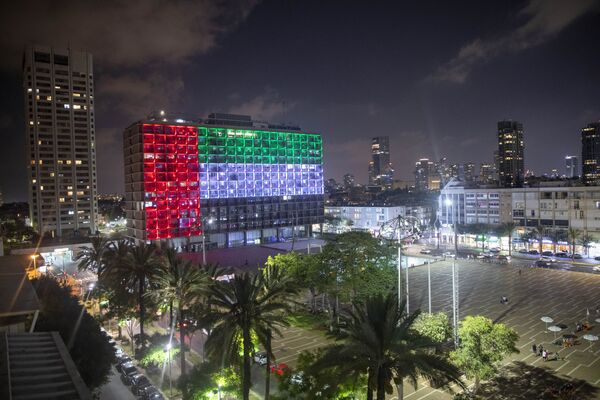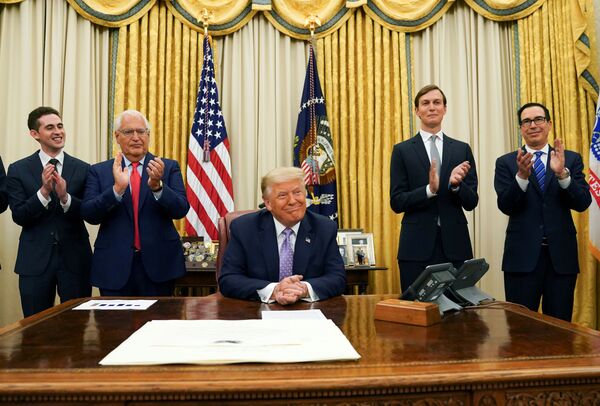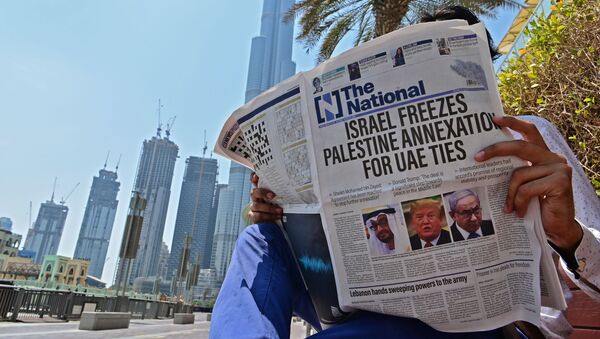UAE Assistant Minister of Cultural and Public Diplomacy Omar Saif Ghobash has said that the Emirates prioritised their own interests and sovereign rights when they concluded the deal with Israel. He also pointed out that the UAE-Israel agreement was made during an era of digitalisation and globalisation, which makes this context different from the circumstances when Israel made peace with Jordan and Egypt.
Sputnik: The minister of state for foreign affairs, Mr Anwar Gargash, has said that the peace treaty between the UAE and Israel represents a strategic turning point for the Arabs. What is the strategy in the long run here?
Omar Saif Ghobash: The strategy is communication. It is engagement. It is having a voice and being able to hear and listen, and being able to basically understand as a front-row player what is going on. This may actually assist us all in coming to a real kind of peace between the Arabs and the Israelis and, of course, with the Palestinians as well.

Sputnik: But in the meantime, the Palestinian leaders have slammed the agreement as a denial of Palestinian and Arab rights. So, is it, in your view?
Omar Saif Ghobash: There are at least two sets of Palestinian leaders: in the Gaza [Strip] and in the occupied West Bank. We are not particularly surprised about Hamas’s declaration. And to be honest, we are not particularly surprised about the Palestinian Authority’s Mahmoud Abbas’s condemnation. I think you might know that we have already had some issues with the Palestinian Authority, relating to management, governance, and misappropriation of funds. So, I mean it is not a surprise that they would say something like that.
I think what we need to recognise also is that one of the reasons why we have decided to go ahead and make peace with the Israelis is because our interests can no longer be put behind the interests of these internal political disputes amongst the Palestinians, which actually don’t have very much to do with the Palestinian cause itself. And so once we have disconnected from the Palestinian cause, or the Palestinian side, then that kind of opens up the debate as to what we should do in our own interests.
Sputnik: What would be the diplomatic strategy of Abu Dhabi in order to preserve relations with the states that reject the idea of peace with Israel?
Omar Saif Ghobash: Our priority is to focus on what we decided was in our interests and our sovereign right to make peace with Israel.
If there are other states that decide that they have a problem with this, as, for example, we have seen with the Turks and the Iranians, we will just have to ride that wave of dissatisfaction, even though we do look at those two states and their reactions to see the irony - at least of the Turks complaining about us for establishing diplomatic relations [with Israel].

Other countries, I mean if you could name a few, I might be able to give you an indication of how we’d feel, but I don’t think we are going to be sort of bowled over by anybody’s reaction.
Sputnik: Then, would we possibly see the Emirates become the pioneer for peace with Tel Aviv in the region?
Omar Saif Ghobash: I think we have already the Egyptians and the Jordanians who have made peace with the Israelis. I think our peace is likely to be a very different kind of peace. And just speaking to young men and women, and even older people in the Emirates, there is a great deal of curiosity, there is a great deal of interest. You know, every single one of us has been in some way affected by the Palestinian cause and the Palestinian issue, and so it is very interesting to see the immediate emotional reaction of people here. But for the most part, people are just very interested and curious to see what it is to be like in Israel.
I think we are going to be looking at it through the lens or the prism of our daily lives, which are non-ideological. We are just very interested in exploring the world.

You were asking whether this might lead to other or rather [be] pioneering, in a sense. I think yes, it is a possibility, because Jordan and Egypt made peace with Israel in very different circumstances. We are making peace in an era of great technological innovation and globalisation. And there is already a huge amount – just in speaking to Israeli journalists and people out of Israel: the fact is that we all speak a global language. And that is one of the most interesting things that is coming out of this: that the people are connecting immediately. A lot of kids are sort of popping up in the Emirati space, who have either learnt Hebrew or spent time studying Hebrew just out of curiosity. And now they are able to show that they are interested in this.
Sputnik: Just to bring you back to the still touchy moment with the Palestinian cause, and you have said yourself that there is a lot of people here [in the UAE] who have been touched by it, the Israeli prime minister has – right after the establishment of the agreement – reiterated that the annexation plan is still on the table and he has declared that they are not going to give up their lands. What would the United Arab Emirates do if he actually un-shelves the plan and goes forth with it?
Omar Saif Ghobash: You know, to be honest, we do not think that that is likely. I don’t think we would have walked into an agreement had there not been certain guarantees. On the other hand, we do recognise even at the point on the Palestinian side and on the Israeli side that everybody has their interest groups and the conventional rhetoric that they must come up with. So, we are interpreting his statements in light of the electoral process in Israel and the promises that he has made to various groups. He [Benjamin Netanyahu] is a survivor. He is a person who calculates and recalculates.
So we don’t think that that is to be taken at face value. You know, here the Israelis also need to think a little and that is that it is a big step for the United Arab Emirates and a Gulf State to make peace. What the Israeli establishment should understand is that it is probably not a good thing to use our outreach, this breakthrough that we have jointly made, in order to gain some electoral points and really kind of ruin the relationship. So we are hopeful, but we also understand that the Palestinians need to make their own moves as well. And that is what we are really hoping – that the Palestinians will come to the table.
Sputnik: Would the peace agreement benefit the UAE culturally and economically? What kind of economic benefits do you anticipate?
Omar Saif Ghobash: The economic benefits – I think we are a global platform. As a state we are a global platform: we have our ports, we have our airlines, we have all kinds of tech spaces. And there is no doubt that the Israelis are very impressive in the tech space themselves. We have financial centres here in the Emirates and I think connecting with Israel would add more volume potentially to those spaces.
And culturally, again, I mean I have had people send me, Emiratis sending me, letters saying: “Hey, can we come and join the embassy in Israel? Is it open?” or “When can I sign up to learn Hebrew?” So culturally I think the Israelis and the Palestinian Israelis are very creative and active. And I think it is going to be absolutely fascinating for the Emiratis to see how the Palestinian Israelis and the Jewish Israelis actually meet and mix and see kind of the crossover of cultures. So I think it is a really exciting topic.




